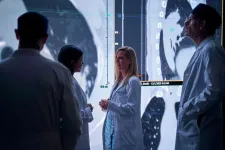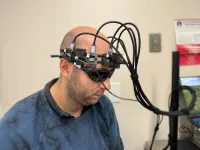(Press-News.org) WASHINGTON, September 30, 2024 — An accelerated course of radiation therapy does not increase complications for patients who undergo breast reconstruction following a mastectomy, new research shows. Findings of the large, phase III RT CHARM trial (Alliance A221505) will be presented today at the American Society for Radiation Oncology (ASTRO) Annual Meeting.
While radiation therapy following mastectomy to remove breast cancer is known to improve survival rates for certain patients who are at higher risk of recurrence, RT CHARM is the first multi-institutional international study to show that a shorter course of post-mastectomy radiation, combined with breast reconstruction, is safe and effective. Cutting treatment time nearly in half—from 25 to 16 treatment sessions—could make post-mastectomy radiation a more accessible option for patients.
“Over the past 10 years, we’ve tried to move all patients who need breast radiation to a shorter, more convenient schedule,” said Matthew M. Poppe, MD, FASTRO, the principal investigator of the trial and a professor of radiation oncology at the University of Utah in Salt Lake City. “But patients after mastectomy who were planning breast reconstruction were the one group where we didn’t have sufficient data to support shorter courses. Now, the results of this trial show we can safely reduce treatment time for these patients to three weeks, without compromising their reconstruction.”
Breast cancer is the second most frequently diagnosed cancer for women in the U.S. About 40% of people with breast cancer have mastectomies, and of that group, the majority undergo reconstructive breast surgery.
A good portion of patients who get mastectomies also need radiation therapy to the chest wall and lymph nodes, to help prevent their cancer from returning. Historically, radiation therapy for breast cancer generally occurs over a period of five to six weeks, but recent research has shown a shorter course of treatment is just as effective at preventing the cancer from returning and can also improve patients’ quality of life. Patients seeking post-mastectomy radiation were typically excluded from these studies, however, due to concerns that the higher daily doses of radiation might increase side effects and impact the reconstructive process.
RT CHARM was designed to test whether that would be the case, Dr. Poppe said. He and his colleagues enrolled 898 patients with unilateral invasive breast cancer at 209 academic and community-based cancer centers across the U.S. and Canada. Eligible patients included those with larger tumors (pT3N0) or smaller tumors and invasion of the regional lymph nodes (pT0-2 pN1-2). The median patient age was 46 years, and all patients were planning immediate or delayed breast reconstructive surgery following post-mastectomy radiation.
Patients were randomized to receive either conventional radiation consisting of 25 fractions delivered across five weeks (50 Gy total; n=449) or hypofractionated radiation consisting of 16 fractions delivered across roughly three weeks (42.56 Gy total; n=449). Slightly more than half of the patients (51%) received chemotherapy prior to their mastectomies, and 37% received chemotherapy following mastectomy.
Among the 650 patients who completed reconstruction during the study period, 59% had implants alone and 41% had autologous reconstruction using their own tissue, with or without implants. Researchers followed these patients to document any reconstruction complications, including issues with wound healing, hospital readmission, unplanned re-operation, reconstruction failure or capsular constructure, which involves scar tissue affecting the new breast. The median follow-up was five years.
Two years after reconstructive surgery, 14% of patients who had the shorter course of radiation experienced complications, compared to 12% of those who had the standard course of treatment. This difference was considered statistically non-inferior (Z=3.373, p=0.0004). Treatment-related side effects were equally mild for both groups, occurring for fewer than 6% of patients on either treatment arm.
“We expected a complication rate of 25 to 35% based on prior, single institution studies of patients who received reconstructive surgery and radiation,” said Atif J. Khan, MD, senior author of the study and a radiation oncologist at Memorial Sloan Kettering Cancer Center in New York. “It was very exciting to see a complication rate that was nearly half what we anticipated.”
Regardless of treatment schedule, patients experienced fewer complications following autologous versus implant-only reconstruction (8.7% autologous vs. 15.5% implant-only, p=0.0043).
Within three years of treatment, recurrence rates were similar, with cancer recurrence in just 1.5% of patients who received the shorter course of radiation, compared to 2.3% of those in the conventional arm. Without radiation, typical recurrence following mastectomy in patients with high-risk disease is 20-30%, said Dr. Khan.
“Radiation therapy after mastectomy saves lives. Patients shouldn’t have to choose between radiation or no radiation based on their desire for reconstruction, or because they can't take six weeks out of their lives,” he said.
Cutting treatment time in half also saves patients time and money. From conversations with his patients, Dr. Poppe said he already knows how big an impact a shorter treatment course can have on their lives.
“The majority of my patients live two to five hours away from our cancer hospital. Taking five or six weeks of time, uprooting your family or leaving your business behind to move closer to the cancer center — even though it’s important for survival, it can be out of reach for a lot of patients. When I tell people they can do three weeks of radiation instead of six weeks, you can see their relief.”
Dr. Poppe and Dr. Khan said they hope their findings will encourage more cancer centers to adopt a shorter course of radiation treatment for any patient who has a mastectomy. “There’s been a slow start to moving to shorter treatment courses after mastectomy, even with no reconstruction,” said Dr. Poppe. “But now we have robust data, from hundreds of academic and community centers, and from patients with any type of reconstruction, that clearly show the safety and effectiveness of short course radiation.”
###
Attribution to the American Society for Radiation Oncology (ASTRO) Annual Meeting is requested in all coverage.
This press release contains updated findings/data from the study authors.
Study/Presentation Details
Abstract 1: A randomized trial of hypofractionated post-mastectomy radiation therapy (PMRT) in women with breast reconstruction (RT CHARM, Alliance A221505)
News Briefing: Monday, September 30, 10:00 a.m. Eastern time. Details here. Register here.
Scientific Presentation: Monday, September 30, 1:30 p.m. Eastern time, Walter E. Washington Convention Center. Email press@astro.org to access the livestream or recording.
This study was supported by grants UG1CA189823, U10CA180821; U10CA180863, CCS 707213 (CCTG); U10CA180868 (NRG Oncology).
ABOUT ASTRO
The American Society for Radiation Oncology (ASTRO) is the largest radiation oncology society in the world, with more than 10,000 members who are physicians, nurses, biologists, physicists, radiation therapists, dosimetrists and other health care professionals who specialize in treating patients with radiation therapies. Radiation therapy contributes to 40% of global cancer cures, and more than a million Americans receive radiation treatments for cancer each year. For information on radiation therapy, visit RTAnswers.org. To learn more about ASTRO, visit our website and follow us on social media.
END
Post-mastectomy radiation therapy can be shortened by nearly half for patients planning breast reconstruction
Large, multi-institution study finds hypofractionation does not increase complications regardless of reconstruction type or timing
2024-09-30
ELSE PRESS RELEASES FROM THIS DATE:
IMRT and proton therapy offer equally high quality of life and tumor control for people with prostate cancer
2024-09-30
WASHINGTON, September 30, 2024 — People with low- and intermediate-risk prostate cancer treated with either of two types of contemporary radiation therapy — proton beam therapy or intensity modulated radiation therapy (IMRT) — achieved equally high rates of tumor control with no differences in patient-reported quality of life, according to a first-of-its-kind phase III clinical trial comparing the two technologies. Findings of the PARTIQoL trial will be presented today at the American Society for Radiation Oncology (ASTRO) Annual Meeting.
“We tested two contemporary, advanced forms of external ...
Timing matters when adding immunotherapy to chemoradiation for patients with limited-stage small cell lung cancer
2024-09-30
WASHINGTON, September 30, 2024 — People with limited-stage small cell lung cancer may benefit from adding immunotherapy to chemoradiation, but not if both treatments are given at the same time, new research finds. The results suggest that the timing of when immunotherapy is given plays a key role in its ability to extend survival. Findings of the multi-institutional phase III trial, which also found that twice-daily radiation treatments offer greater survival benefits than once-daily treatment, will be presented today at the American Society for Radiation Oncology (ASTRO) Annual Meeting.
The ...
Existing standard chemoradiation superior to deintensification approaches for HPV-related oropharyngeal cancer
2024-09-30
WASHINGTON, September 30, 2024 — Researchers looking to de-intensify radiation treatments for people with early-stage, HPV-associated oropharyngeal cancer to prevent long-term side effects halted a large, randomized phase II/III trial after patients in the control arm reached a record high, two-year progression-free survival rate of 98%. De-intensified treatments involving a lower radiation dose and immunotherapy in place of chemotherapy did not perform as well as the more rigorous chemoradiation approach. Findings of the NRG Oncology HN005 trial will be presented today at the American Society for Radiation Oncology (ASTRO) Annual ...
CAR-T safe and effective on an outpatient basis in community hospitals
2024-09-30
(WASHINGTON – September 30, 2024) In the largest prospective study to date examining the use of chimeric antigen receptor (CAR)-T therapy in a community setting on an outpatient basis, patients with relapsed or refractory large B-cell lymphoma (LBCL) responded well to treatment with few serious side effects, according to results published today in Blood Advances.
LBCL is a cancer affecting B lymphocytes, a type of white blood cell. It can progress rapidly and is fatal if untreated, although most forms of LBCL respond well to standard ...
City of Hope to present leading-edge radiotherapy treatments for people with lung, genitourinary and blood cancers at the American Society for Radiation Oncology Annual Meeting
2024-09-30
LOS ANGELES — City of Hope®, one of the largest and most advanced cancer research and treatment organizations in the U.S. and ranked among the nation’s top 5 cancer centers by U.S. News & World Report, is part of today’s press conference program at the American Society for Radiation Oncology (ASTRO) Annual Meeting, where a renowned City of Hope radiation oncologist will present phase 3 clinical trial data showing that people with limited-stage small cell lung cancer may benefit from adding immunotherapy to chemoradiation, but not if both treatments are given at the same time. The results suggest that the timing of when immunotherapy is given plays a key role in its ...
A new and unique fusion reactor comes together with PPPL's contributions
2024-09-30
Like atoms coming together to release their power, fusion researchers worldwide are joining forces to solve the world’s energy crisis. Harnessing the power of fusing plasma as a reliable energy source for the power grid is no easy task, requiring global contributions.
The Princeton Plasma Physics Laboratory (PPPL) — a U.S. national laboratory funded by the Department of Energy (DOE) — is leading several efforts on this front, including collaborating on the design and development of a new fusion device at the University of Seville in Spain. The SMall Aspect Ratio Tokamak (SMART) strongly ...
Reduced risk of serious cardiovascular disease after COVID vaccination
2024-09-30
People who have been fully vaccinated against COVID-19 have a significantly lower risk of developing more severe cardiovascular conditions linked to COVID-19 infection, according to a nationwide study at the University of Gothenburg. At the same time, some cardiovascular effects are seen after individual doses of the vaccine.
The COVID-19 vaccine aims to reduce complications and overall mortality from the disease. At the same time, some cardiovascular effects have been seen after individual doses of the vaccine. A rare acute side effect is inflammation of the cardiac muscle or the pericardium in young men following mRNA vaccination. In terms of other cardiovascular ...
New laser-based headset can measure blood flow, assess risk of stroke
2024-09-30
When physicians want to know more about a patient’s risk of cardiovascular disease, they can order a cardiac stress test. But when it comes to risk of stroke, there is no equivalent scalable and cost-effective test of the brain’s function to help physicians counsel patients on their potential risk. A questionnaire that asks patients about contributing risk factors is currently the best tool for estimating such risk.
Now a team of engineers and scientists from Caltech and the Keck School ...
Researchers close in on understanding possible cause of Alzheimer’s disease
2024-09-30
CLEVELAND—With a four-year, $3.3 million grant from the National Institutes of Health (NIH), researchers from Case Western Reserve University will study whether certain brain proteins may play a role in the development of Alzheimer’s disease.
Alzheimer’s disease is a brain disorder that slowly destroys memory and thinking skills. According to the Alzheimer’s Association, nearly 7 million Americans 65 and older are living with the disease and there are more deaths from Alzheimer’s than breast and prostate cancer combined.
Previous research has ...
New synthesis strategy could speed up PFAS decontamination
2024-09-30
HOUSTON – (Sept. 30, 2024) – Rice University engineers have developed an innovative way to make covalent organic frameworks (COFs), special materials that can be used to trap gases, filter water and speed up chemical reactions. COFs have the potential to address significant environmental challenges, including energy storage and pollution control. An example of that is their potential use in the decontamination of “forever chemicals” or per- and polyfluoroalkyl substances (PFAS).
Rice chemical engineer Rafael Verduzco and his team have described a new way to synthesize high-quality ...
LAST 30 PRESS RELEASES:
A “smart fluid” you can reconfigure with temperature
New research suggests myopia is driven by how we use our eyes indoors
Scientists develop first-of-its-kind antibody to block Epstein Barr virus
With the right prompts, AI chatbots analyze big data accurately
Leisure-time physical activity and cancer mortality among cancer survivors
Chronic kidney disease severity and risk of cognitive impairment
Research highlights from the first Multidisciplinary Radiopharmaceutical Therapy Symposium
New guidelines from NCCN detail fundamental differences in cancer in children compared to adults
Four NYU faculty win Sloan Foundation research fellowships
Personal perception of body movement changes when using robotic prosthetics
Study shows brain responses to wildlife images can forecast online engagement — and could help conservation messaging
Extreme heat and drought at flowering could put future wheat harvests at risk
Harlequin ichthyosis: a comprehensive review of pathogenesis, diagnosis, and management
Smithsonian planetary scientists discover recent tectonic activity on the Moon
Government censorship of Chinese chatbots
Incorporating a robotic leg into one’s body image
Brain imaging reveals how wildlife photos open donor wallets
Wiley to expand Advanced Portfolio
Invisible battery parts finally seen with pioneering technique
Tropical forests generate rainfall worth billions, study finds
A yeast enzyme helps human cells overcome mitochondrial defects
Bacteria frozen in ancient underground ice cave found to be resistant against 10 modern antibiotics
Rhododendron-derived drugs now made by bacteria
Admissions for child maltreatment decreased during first phase of COVID-19 pandemic, but ICU admissions increased later
Power in motion: transforming energy harvesting with gyroscopes
Ketamine high NOT related to treatment success for people with alcohol problems, study finds
1 in 6 Medicare beneficiaries depend on telehealth for key medical care
Maps can encourage home radon testing in the right settings
Exploring the link between hearing loss and cognitive decline
Machine learning tool can predict serious transplant complications months earlier
[Press-News.org] Post-mastectomy radiation therapy can be shortened by nearly half for patients planning breast reconstructionLarge, multi-institution study finds hypofractionation does not increase complications regardless of reconstruction type or timing





